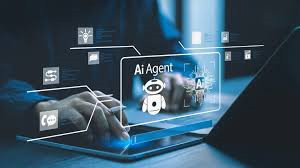
IN the fast moving world of artificial intelligence, terminology often struggles to keep pace with innovation, leading to significant confusion.
One of the most common points of ambiguity revolves around the phrase “AI Agency”.
This term, along with its conceptual relatives AI Agent and Agentic AI, holds a crucial, yet conflicting, dual meaning.
The phrase “AI Agency” means two completely different things, depending on who is talking, and the mix-up is causing real confusion in boardrooms and technical discussions alike.
One meaning is philosophical/technical (how much power we give machines); the other is purely commercial (a consulting firm that sells AI services). This article untangles the four key terms everyone keeps conflating:
AI Agent — the software “digital employee”
Agentic AI — the capability that makes that employee smart and autonomous
AI Agency (conceptual) — the authority we grant the agent to act
AI Agency (commercial) — the human-led consultancy firm
The AI agent
At its heart, an AI Agent is the specific piece of software designed to do a job. You can think of it as a digital employee or an autonomous tool, and its fundamental role is to perceive its environment, process that information, decide, and then take an action to complete a set task on a user’s behalf.
Modern AI Agents are now typically powered by Large Language Models (LLMs). The LLM acts as the Agent’s reasoning core, allowing it to translate ambiguous instructions given in plain English (eg “Find me a cheap weekend trip”) into a logical, multi-step plan.
For a system to be a useful Agent, it must have a complete architecture.
This includes perception for gathering input, reasoning and planning for strategising the goal, and action (tool use) for executing the plan by connecting to external tools such as search engines.
Furthermore, it needs memory for keeping conversational context and learning from past results.
The AI Agent is the fully-assembled, goal-oriented builder, the programme that uses its tools and brain to construct the final product.
Agentic AI
Agentic AI is not the entity itself, but the quality or skill set that the AI Agent possesses. It describes the degree of autonomy, intelligence, and initiative an AI system exhibits, and it is the core capability that allows an Agent to be effective.
The defining characteristic of Agentic AI is its capacity for autonomous workflow and self-correction. This allows the system to operate beyond a simple, rigid script, entering a flexible, iterative cycle of work.
A system with high Agentic AI does not just execute instructions; it takes initiative and reflects on its own performance.
If an action fails or produces a poor result, the Agent does not stop and ask for help; it proactively enters a loop where it sees the suboptimal result, re-plans the strategy using its reasoning core, and acts again, using the refined plan.
For example, if the Agent searches for cheap flights and the booking site is down, high Agentic AI allows it to decide, “I’ll try a different flight aggregator, or perhaps search for trains instead,” without needing confirmation.
This means Agentic AI is the skill and initiative of the builder, the know-how to realise a material is missing, decide to drive to the supplier, and adjust the construction timeline without pausing work.
AI agency
In technical and philosophical discussions, AI Agency refers to the level of permission, authority, and freedom that a human grants an AI Agent to act on their behalf.
This is a critical governance boundary that determines the real-world impact of the Agent’s actions, defining whether the AI is merely a suggestion engine or a powerful, independent operator.
Agency exists on a scale, which is typically set by the user or developer. Systems with Low Agency must ask for explicit human approval for every consequential action, especially those involving finance or external communication.
Conversely, systems with High Agency operate largely autonomously under broad, high level instructions, making key decisions (such as buying stock or re-prioritising business tasks) without step-by-step human confirmation.
The ongoing safety and ethical discussions in AI are fundamentally about controlling and limiting this Conceptual AI Agency.
As systems become more Agentic (more capable), the risks associated with granting them high Agency increase significantly. Therefore, Conceptual AI Agency is the managerial oversight given to the builder—the permission to spend up to a certain budget or the authority to hire subcontractors without checking with the homeowner first.
AI agency (commercial)
In stark contrast to the conceptual definition, "AI Agency" is also a widely used term in the business world, where it refers to a human-led commercial firm.
This firm’s specialisation is helping other businesses implement, integrate, and use artificial intelligence. These commercial AI Agencies are essentially consulting firms, and their services often include Strategy and Roadmapping, advising clients on where and how to best apply AI to solve business problems. They also offer custom implementation, building and integrating tailored AI solutions, which often involve deploying specific AI Agents (the software entities) tailored to the client’s needs.
Furthermore, they provide ethical guidance and training and upskilling, ensuring the client’s staff are prepared to work alongside new AI tools. The rise of these commercial “AI Agencies” is a direct result of businesses needing expert help to adopt the rapidly advancing capabilities of Agentic AI. Thus, a commercial AI Agency is a consultancy — a company full of human experts who advise other companies on how and when to hire digital builders (AI Agents).
Conclusion
The phrase “AI Agency” forces us to consider two essential dimensions of the AI revolution: the theoretical scope of machine authority and the practical reality of the commercial market.
For those building and studying AI, understanding the difference between the AI Agent (the thing), Agentic AI (the capability), and Conceptual AI Agency (the authority) is vital for safety and effective design.
For those navigating the marketplace, recognising that an AI Agency is often the entry point for implementing these systems is equally crucial. As AI continues its rapid development, clarity in our language will be the foundation for responsible innovation.
Bangure is a filmmaker with a media degree and substantial experience in media production and management. He previously served as the chairperson of the National Employment Council for the Printing, Packaging, and Newspaper Industry. A dedicated enthusiast and scholar of artificial intelligence, Bangure combines his creative and technical skills to delve into innovative advancements. — [email protected].











